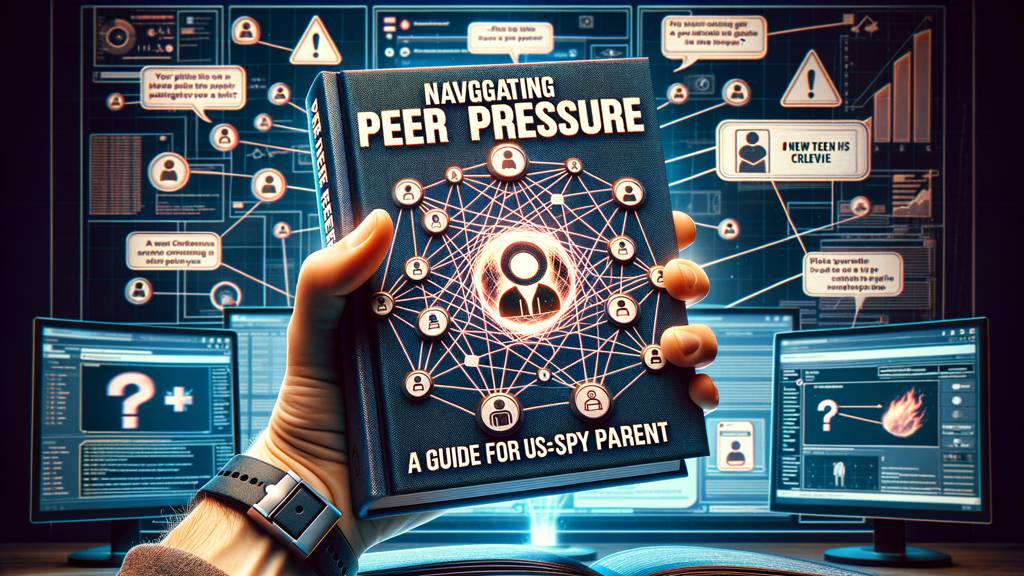Navigating Peer Pressure: A Guide for Parents Using Spy Parent

Understanding Peer Pressure
Peer pressure is an age-old challenge that teenagers face as they navigate their formative years. It involves the influence exerted by peers to conform to certain behaviors, values, or norms. While peer pressure can sometimes encourage positive behavior, it often leads to risky activities, especially when teens feel compelled to fit in. According to a study by the National Institute on Drug Abuse, about 30% of teens have engaged in risky behaviors due to peer pressure. Understanding the dynamics of peer pressure is crucial for parents who wish to guide their children through these turbulent times.
In today's world, peer pressure extends beyond face-to-face interactions. Social media platforms amplify this phenomenon, making it more pervasive and intense. Teens often feel the need to portray a certain image online, leading them to participate in trends and challenges that may not align with their values or safety. As parents, recognizing the underlying causes and manifestations of peer pressure can help in addressing its impact on your teen's life.
Recognizing Signs of Peer Pressure in Teens
Identifying signs of peer pressure can be challenging, as teens are often reluctant to discuss these issues openly. However, there are several indicators that parents can watch for. Changes in behavior or mood swings are common signs; a once cheerful teen might become withdrawn or irritable. Academic performance might also decline as a result of distractions or stress caused by trying to meet peers' expectations.
Parents should also pay attention to changes in social circles or interests. If your teen suddenly adopts new habits or seems influenced by a new group of friends, it could be a sign of peer pressure. Additionally, unexplained changes in appearance or sudden secrecy about their activities may warrant further investigation.
The Role of Technology in Modern Peer Pressure
Technology has revolutionized how teens interact with each other, creating new avenues for peer pressure. Social media platforms like Instagram and TikTok serve as breeding grounds for trends that can quickly gain traction among young users. The desire for likes and validation can drive teens to partake in potentially harmful activities such as the infamous "Fire Challenge" selfie craze.
Moreover, messaging apps and group chats facilitate constant communication among peers, making it difficult for teens to escape the pressures even at home. Cyberbullying and online shaming are additional threats that technology introduces into the mix, exacerbating feelings of inadequacy and anxiety among teenagers.
Introducing Spy Parent: A Tool for Monitoring and Guidance
Spy Parent offers a comprehensive solution for parents looking to navigate the complexities of modern parenting amidst these challenges. This innovative tool allows parents to monitor their teen's online activity discreetly while providing insights into potential red flags like engagement with dangerous trends or interactions with questionable individuals.
By using Spy Parent, you gain access to features such as activity logs and alerts that notify you of concerning behavior patterns without infringing on your teen's autonomy entirely. It's an invaluable resource for maintaining oversight while fostering trust within your parent-child relationship.
| Feature | Description |
|---|---|
| Activity Logs | Track your teen's online interactions and app usage |
| Alerts | Receive notifications about potential risks |
| Insights | Analyze behavior patterns and identify areas needing guidance |
Effective Communication Strategies with Your Teen
While tools like Spy Parent provide essential support, open communication remains key in helping your teen manage peer pressure effectively. Start by creating an environment where they feel comfortable discussing their concerns without fear of judgment or punishment.
Engage in active listening when your teen shares their experiences—validate their feelings rather than dismissing them outrightly. Use empathy-driven language such as "I understand how difficult this must be" instead of resorting immediately into advice-giving mode which might come off as dismissive.
- Listen actively: Show genuine interest in what they have to say.
- Empathize: Validate their feelings without judgment.
- Encourage dialogue: Ask open-ended questions that promote discussion.
Balancing Privacy and Safety: Ethical Considerations
As you utilize tools like Spy Parent, it's essential not only from an ethical standpoint but also from fostering trust within familial relationships—to balance privacy with safety effectively. Transparent conversations about why monitoring is necessary can help alleviate any potential mistrust between you and your child regarding privacy concerns.
Ensure that both parties understand each other's perspectives—explain how monitoring aims primarily at ensuring safety rather than controlling every aspect of life unreasonably so both parties remain aligned towards mutual goals centered around well-being above all else!
Encouraging Positive Peer Interactions
Finally—and perhaps most importantly—encouraging positive peer interactions plays an integral role not just combating negative influences but also building resilience against future pressures! Supportive friendships provide emotional stability during adolescence; therefore facilitating opportunities where these connections flourish becomes paramount!
Encourage involvement extracurricular activities like sports clubs volunteer groups where shared interests naturally foster camaraderie amongst participants thereby strengthening bonds built upon mutual respect admiration rather than superficial comparisons alone!
Remember: nurturing supportive environments ultimately empowers adolescents navigate successfully amidst ever-evolving societal landscapes!





